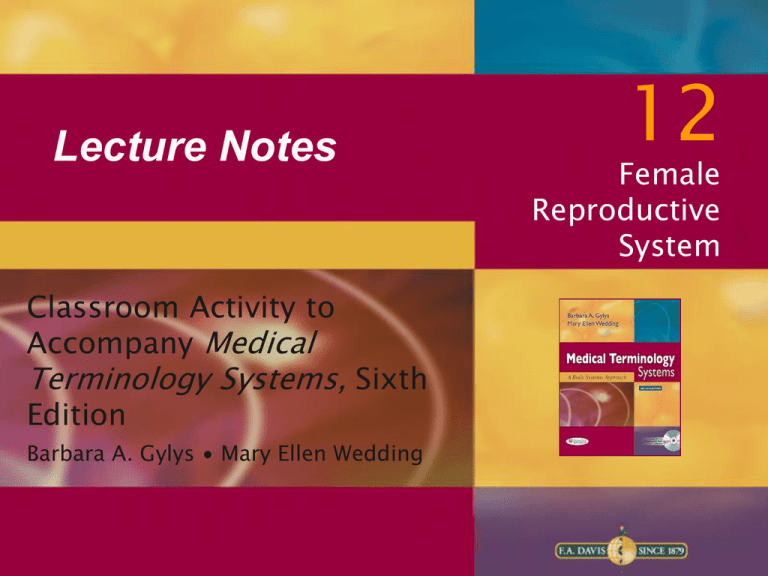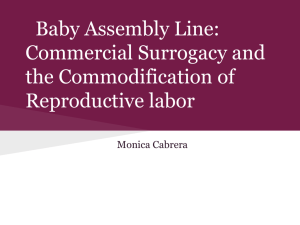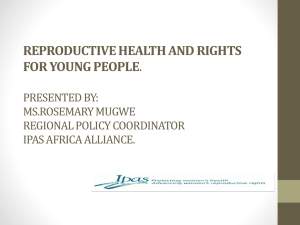
Lecture Notes
Classroom Activity to
Accompany Medical
Terminology Systems, Sixth
Edition
Barbara A. Gylys ∙ Mary Ellen Wedding
12
Female
Reproductive
System
12
FEMALE REPRODUCTIVE SYSTEM
Structure
• Ovaries
• Fallopian tubes
• Uterus
• Vagina
• Clitoris
• Vulva
2
12
FEMALE REPRODUCTIVE SYSTEM
Function
• Organs and glands that produce and unite
female sex cells (ova or egg cells)
• Transport ova to site of fertilization
• Perpetuate the species
• Pass genetic material from generation to
generation
3
12
FEMALE REPRODUCTIVE SYSTEM
Structure and Function Exercise
Q: Where are the ovaries located?
A: Pelvic cavity, one on each side of the uterus.
Q: What is the biological role of mammary glands?
A: Secrete milk for nourishment of the newborn.
Q: What do the terms gestation and parturition
mean?
A: Gestation is the period from the fertilization of
the ovum until birth; parturition refers to the
process of giving birth.
4
12
FEMALE REPRODUCTIVE SYSTEM
Ectopic Pregnancy
Signs and Symptoms
• Fertilized ovum
implants and grows
in places other than
the uterine cavity.
5
12
FEMALE REPRODUCTIVE SYSTEM
Ectopic Pregnancy
Signs and Symptoms (continued)
• Common site is interior of the fallopian tube.
• Other sites include the ovary, wall of the
uterus, or anywhere in the pelvic cavity.
• Signs of early pregnancy may be present.
• Abdominal pain and tenderness, as well as
slight vaginal bleeding.
• Rupture of a fallopian tube is life threatening
and may cause severe abdominal pain and
intra-abdominal bleeding.
6
12
FEMALE REPRODUCTIVE SYSTEM
Ectopic Pregnancy
Treatment
• Laparotomy.
• Ruptured fallopian tube may require
removal.
• All attempts are made to save the
ovary.
• Blood transfusion may be necessary in
severe intra-abdominal bleeding or
hypovolemic shock.
7
12
FEMALE REPRODUCTIVE SYSTEM
Clinically Related Exercise
Q: Ellen presents to ED complaining of abdominal pain. CT of the abdomen
reveals an ovum has implanted in her fallopian tube. A pregnancy for an
implanted ovum outside of the uterine cavity is known as an
___________________.
A: ectopic pregnancy
Q: The doctor diagnoses Heather with ectopic pregnancy. She asks her to
explain what causes this condition.
A: She states it is caused by a blockage or scarring of the tubes which prevents
the fertilized egg from being transported to the uterus.
Q: The nurse explains that a common cause of scarring or blockage of the
fallopian tubes is due to infections such as PID. This abbreviation is defined
as _____________________.
A: pelvic inflammatory disease
Q: Jean is diagnosed with ectopic pregnancy in the fallopian tube. The
obstetrician informs her of the risks involved with this type of pregnancy.
What are some of these risks?
A: The fallopian tube may rupture, which is life threatening. It may also cause
severe abdominal pain and intra-abdominal bleeding.
8
12
FEMALE REPRODUCTIVE SYSTEM
Breast Cancer
Signs and Symptoms
• Early symptoms include swelling, lump,
dimpling, retraction of nipple, discharge
from nipple, tenderness.
• Most common site for a lump is in the
upper outer quadrant of the breast.
• Advanced symptoms include nodularity,
redness, edema, ulceration of skin,
enlargement or shrinkage of breast.
9
12
FEMALE REPRODUCTIVE SYSTEM
Breast Cancer
Signs and Symptoms (continued)
• Most common malignancy of women
in the United States.
• Appears to be associated with ovarian
hormonal function.
• High-fat diet appears to increase the
incidence of breast cancer.
10
12
FEMALE REPRODUCTIVE SYSTEM
Breast Cancer
Signs and Symptoms (continued)
• Family history of breast cancer.
• Possibly use of hormone replacement
therapy (HRT), especially for
prolonged periods of time.
11
12
FEMALE REPRODUCTIVE SYSTEM
Breast Cancer
Treatment
• Lumpectomy
• Primary tumor in red
and surrounding
tissue removed
during lumpectomy
in pink.
12
12
FEMALE REPRODUCTIVE SYSTEM
Breast Cancer
Treatment (continued)
• Modified radical
mastectomy.
13
12
FEMALE REPRODUCTIVE SYSTEM
Breast Cancer
Treatment (continued)
• Adjuvant chemotherapy may be
indicated after surgery if malignant
cells are found in the lymph nodes.
• Any combination of surgery,
radiation, chemotherapy, and
hormonal therapy.
14
12
FEMALE REPRODUCTIVE SYSTEM
Clinically Related Exercise
Q: Mrs. S had a mastectomy because of breast cancer and the doctor explains
the postsurgical, adjuvant chemotherapy he is recommending. Can you
explain the purpose of adjuvant chemotherapy?
A: It is chemotherapy that is used to enhance or extend the effects of surgery
and to eliminate any possible metastasis.
Q: Lisa finds a lump in her breast while performing breast self- examination.
After mammography shows a small tumor, an excision of the breast tumor
is performed. This is known as a ________________.
A: lumpectomy
Q: Sasha is diagnosed with breast cancer and asks the doctor the types of
treatments prescribed for breast cancer besides surgery.
A: He states that radiation, chemotherapy, and hormonal therapy are the
treatments other than surgery.
Q: Mary is scheduled for a modified radical mastectomy to treat her breast
cancer. This surgical procedure involves removal of the entire breast and
excision of the underarm lymph nodes. The medical term for removal of the
lymph node is _____________.
A: lymphadenectomy
15
12
FEMALE REPRODUCTIVE SYSTEM
Endometriosis
Signs and Symptoms
• Growth of
endometrial tissue
in areas outside the
uterus.
16
12
FEMALE REPRODUCTIVE SYSTEM
Endometriosis
Signs and Symptoms (continued)
• Dysmenorrhea with pain in lower
back and vagina.
• Severity of pain does not necessarily
indicate extent of the disease.
• Dyspareunia, dysuria, and,
sometimes, painful defecation.
17
12
FEMALE REPRODUCTIVE SYSTEM
Clinically Related Exercise
Q: Joan, a 22-year-old, presents to the office with severe pain with
menstruation. Her complaint is documented as _________________________.
A: dysmenorrhea
Q: During laparoscopy, ectopic deposits of endometrial tissue are noted within
the pelvis. The doctor charts this condition of endometrial tissue outside of
the uterus as (endometritis, histometrial, endometriosis).
A: endometriosis
Q: A 15-year-old arrives at the clinic for birth control counseling. After
weighing her options, she decides that birth control pills are her best option
because they are highly reliable and easy to use. The abbreviation for the
oral contraceptives is __________.
A: OCPs
Q: June comes into the clinic complaining of pain during sexual intercourse.
The MA documents this complaint as (dysmenorrhea, dyspareunia, dysuria).
A: dyspareunia
18
12
FEMALE REPRODUCTIVE SYSTEM
Medical Vocabulary
• amniocentesis
• Transabdominal
puncture of the
amniotic sac under
ultrasound guidance
to remove amniotic
fluid.
19
12
FEMALE REPRODUCTIVE SYSTEM
Medical Vocabulary
(continued)
•
•
•
•
•
•
•
•
candidiasis
cerclage
cervicitis
chlamydia
eclampsia
endometritis
gynecologist
menarche
20
12
FEMALE REPRODUCTIVE SYSTEM
Medical Vocabulary
(continued)
•
•
•
•
•
•
•
•
menorrhagia
neonatal
neonate
obstetrician
postpartum
primigravida
pseudocyesis
retroversion
21
12
FEMALE REPRODUCTIVE SYSTEM
Diagnostic Procedures
• Laparoscopy
• Visual
examination of
abdominal cavity
with a
laparascope
through one or
more small
incisions in the
abdominal wall,
usually at the
umbilicus.
22
12
FEMALE REPRODUCTIVE SYSTEM
Diagnostic Procedures
(continued)
• Colposcopy
• Hysterosalpingography
• Mammography
• Pap test
23
12
FEMALE REPRODUCTIVE SYSTEM
Word Building Exercise
Q: Visual examination of the vagina:
A: colposcopy
Q: Process of recording (radiography) the uterus and fallopian
tubes:
A: hysterosalpingography
Q: Instrument to examine the abdomen:
A: laparoscope
Q: Incision of the vulva:
A: episiotomy
Q: Surgical repair of the breast:
A: mammoplasty, mastoplasty
Q: Visual examination of the abdomen:
A: laparoscopy
Q: Excision or removal of the breast:
A: mastectomy
24
12
FEMALE REPRODUCTIVE SYSTEM
Medical and Surgical Procedures
• Cerclage
• Dilation and curettage (D&C)
• Hysterosalpingo-oophorectomy
25
12
FEMALE REPRODUCTIVE SYSTEM
Medical and Surgical Procedures
(continued)
• Hysterectomy with
structure shaded
purple.
• Subtotal hysterectomy
(cervix not removed).
• Total hysterectomy
(cervix removed)
• Total hysterectomy plus
bilateral salpingooophorectomy
26
12
FEMALE REPRODUCTIVE SYSTEM
Medical and Surgical Procedures
(continued)
• Reconstructive
breast surgery.
• Tissue (skin)
expansion.
27
12
FEMALE REPRODUCTIVE SYSTEM
Medical and Surgical Procedures
(continued)
• Transverse rectus
abdominis muscle (TRAM)
flap.
• Surgical creation of a skin
flap (using skin and fat from
lower half of abdomen),
which is passed under the
skin to the breast area,
shaped into a naturallooking breast, and sutured
in place
28
12
FEMALE REPRODUCTIVE SYSTEM
Clinically Related Exercise
Q: Mary presents to the OB clinic in her early third trimester with symptoms
of premature labor. The physician recommends a procedure to suture the
cervix to prevent premature labor and decrease the chance of spontaneous
abortion. This procedure is called _________.
A: cerclage
Q: The patient is scheduled for removal of her uterus and both fallopian
tubes. The physician charts this surgical procedure as a total hysterectomy
plus bilateral ___________________________.
A: salpingo-oophorectomy
Q: Mary presents with heavy bleeding over the last 6 months and is
scheduled to have a a scraping of uterine endometrium with a curette
after dilation of the cervix. The abbreviation for this procedure is
__________.
A: D&C
Q: Susan is considering reconstructive breast surgery following her
mastectomy and is considering the TRAM flap procedure. What is the
meaning of the abbreviation TRAM?
A: transverse rectus abdominis muscle
29
12
FEMALE REPRODUCTIVE SYSTEM
Pharmacology
• Antifungals
• Estrogens
• Hormone replacement therapy (HRT)
• Oral contraceptives (OCPs)
30
12
FEMALE REPRODUCTIVE SYSTEM
Clinically Related Exercise
Q: The patient presents with a vaginal yeast infection. The
physician prescribes a suppository (antifungal, estrogen,
HRT).
A: antifungal
Q: Mrs. A is menopausal and has symptoms of vaginal dryness
and hot flashes. The physician writes her a prescription for
an agent known as a/an (antifungal, estrogen, OCP).
A: estrogen
Q: Lauren, a 22-year-old, is sexually active with her husband
but wants to wait a couple of years before having children.
The NP explains the most effective option to prevent
conception is to use an agent known as a/an (antifungal,
estrogen, OCP).
A: OCP
31









